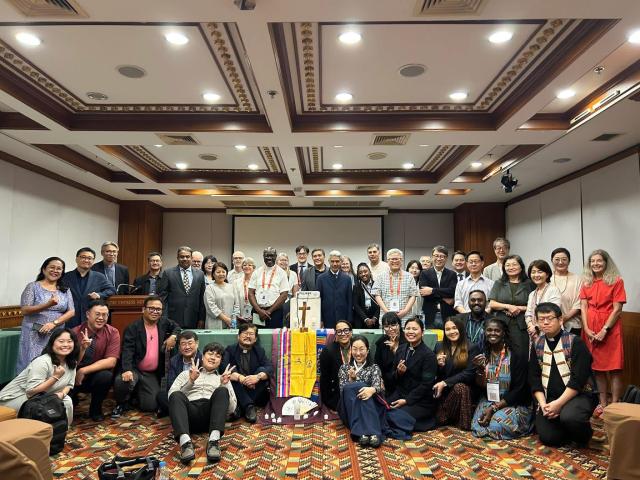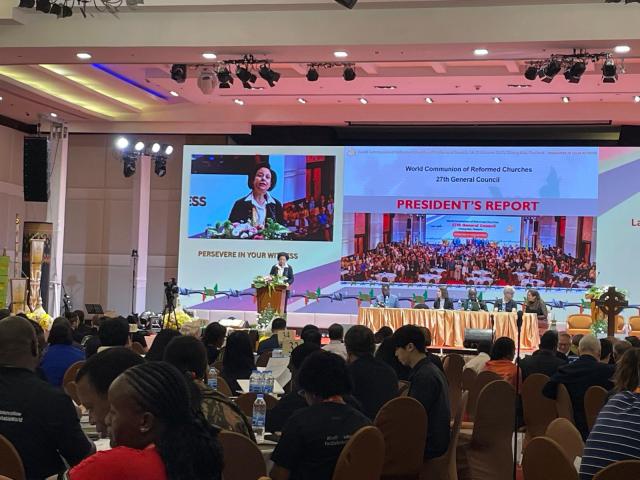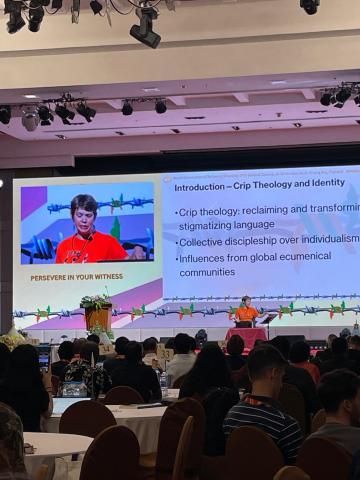Days of deep justice engagement at World Communion of Reformed Churches’ 27th General Council

After a long journey that started with a 14-hour flight from Toronto to Seoul, followed by another five hours to Chiang Mai, Thailand, my body was weary. Yet the moment I arrived at the 27th General Council of the World Communion of Reformed Churches (WCRC)—ongoing from October 14 to 23—I felt a renewed energy. Seeing familiar ecumenical friends and meeting joyful young people enthusiastically serving and welcoming delegates was an uplifting balm.
Day One
Day one officially began with a grand opening ceremony, where over 400 delegates from across the globe converged under the powerful theme “Persevere in Your Witness.” The Church of Christ in Thailand warmly welcomed us, setting a tone of unity, steadfast faith, and hope for the days ahead.
WCRC President Rev. Najla Kassab, a Lebanese pastor, delivered an opening address that struck a deep chord. She said, “In a world marred by injustice, greed, conflict, and climate catastrophe, perseverance in witness is not passive endurance; it is a radical act of faith rooted in hope.” She went on to remind us that “persevering in witness is to trust in God’s faithfulness, to join in Christ’s redemptive suffering for the world, and to stand in solidarity with those bearing crosses of injustice.” Her reflection on the WCRC’s 150-year heritage called us to carry forward the bold witness of our Reformed tradition in justice, unity, and peace.

In moderating a session on peace and reconciliation for Korea, I found this theme echoed with particularly poignancy. A powerful reminder came from a Korean speaker who reflected on the 80 years of division in the Korean peninsula: “No other people in modern history have endured such a prolonged and painful separation. Yet, through prayer and pilgrimage, we find hope and call on the global church to persist in support of peace and unity.”
I also participated in workshops on the future of ecumenical dialogues, and the challenges they face. Many voices emphasized the critical issue how theological dialogues can move beyond intellectual agreements to influence grassroots communities meaningfully.
Day one was nothing short of inspiring. The fellowship, the worship, and the shared mission remind me that despite our world’s challenges, the Spirit is at work among us, renewing and reforming the church in powerful ways.
Day Two
Day two was charged with passion and prophetic witness around urgent justice issues affecting Asia and the global church. Participants were reminded that perseverance amid struggle is vital to faithful witness.
A participant from Korea shared the poignant story of last year’s brief declaration of martial law, highlighting how military personnel hesitated to harm their own people, reflecting, "The spirit of the people—soldiers and civilians alike—stood as one family to prevent bloodshed. This shows the humanity and resilience that we must hold onto."
From the Philippines, a participant who is the daughter of a former political prisoner bore witness: "Even in imprisonment, my father taught me that God’s truth cannot be contained or silenced; it will always prevail. We must persevere, resist, and persist because justice is worth fighting for."
An ecumenical partner urged for a broad movement of justice: "Isolated acts of solidarity are not enough. We need a global ecumenical movement addressing structural injustices, colonial legacies, and economic exploitation to bring about true peace and justice."
The day culminated in a poignant public witness hearing. Here, the pressing justice issues that must animate the 27th General Council’s discernment were named boldly: militarism, ecological degradation, inequality, and the quest for peace and reconciliation. This gathering of diverse voices challenged the global church to sharpen its prophetic witness and to act with urgency for justice and peace, calling the world to listen and respond.
In the midst of these profound conversations, the United Church of Canada found a meaningful moment of gathering to check in over dinner. Delegates, faculty from the Global Institute of Theology, advisors, consultants, and visitors met in debriefing—grateful for the rich contributions made by the United Church community to global ecumenical discourse. Our presence and participation embody a commitment to daring justice that transcends borders, lifting up the gospel call to mend the world. Indeed, we are here seeking to continue the story of Jesus by embodying Christ’s presence in the world.
Day Three
The day began with a powerful Bible study led by Rev. Dr. Miriam Spies from my beloved United Church of Canada, focusing on crip theology. She invited participants to embrace the sacredness and communion with persons with disabilities. Dr. Spies highlighted how systems of oppression, including ableism, are "tools of empire" that use tactics like maiming to marginalize and exclude. Her teaching urged the Communion to dismantle ableist barriers and embody radical hospitality that reflects God's inclusive love.

Interim General Secretary Rev. Dr. Setri Nyomi gave a report reflecting on the Communion's pivotal engagement with pressing justice issues—from economic inequality to climate change, racism, and gender justice—underscoring the power of collective action. Rev. Dr. Nyomi also lauded the Communion's vital ecumenical partnerships, which bolster mission through united advocacy and theological education, driving meaningful impact worldwide. He called for deeper solidarity and mutual support, especially in empowering women’s leadership and youth participation.
Youth delegates presented a poignant testimony about the lived realities of young people in the church. They spoke candidly about the pressures of burnout, social isolation, and the need for authentic spaces that nurture mental health. They called for enhanced fellowship opportunities and a church culture that values rest, reflection, and resilience; for, as one delegate put it, “a church where vulnerability is met with grace."
Women delegates powerfully proclaimed their presence as prophetic witnesses rather than silent objects of history. They highlighted the ongoing struggles for ordination and leadership, noting that while progress has been made, much work remains to achieve full inclusion and justice. They affirmed their collective voice in peace and justice ministries, calling the Communion to embrace gender justice as indispensable to their witness and mission.
Keynote Address: A Call to Persevering Witness
Rev. Dr. Otis Moss III delivered a deeply moving message from Chicago, expressing his deep apologies for his absence and asking for prayers, emphasizing the struggle of his community under ICE and federal troop occupation acting on the unconstitutional orders of the current U.S. administration. He framed this turmoil within a broader global context of suffering—citing the genocide witnessed in Gaza, catastrophic climate change effects, rising right-wing populism, and hostility toward migrants and refugees.
He spoke passionately about the church's responsibility: "We demand the church take a firm stance for the oppressed....We expect the church to remain true to its mission, to stand with the weak, to speak out against injustice, and to give a voice to the voiceless."
Rev. Dr. Moss warned against a "contaminated gospel" that is diluted by prosperity teachings and co-opted by oppressive powers: "Governments will try to contaminate the gospel by co-opting the church to be an arm of empire whose god is power and repression."
He concluded by affirming the critical importance of faithful witness at this historic moment: "Our witness is our hope."
As we gather here in Chiang Mai, surrounded by the stories and struggles of so many, the charge remains clear: Persevere in your witness. Through prayer, solidarity, and action, we stand with our global siblings, determined to embody God’s justice in a world longing for peace.
—Rev. Dr. Japhet Ndhlovu is Executive Minister, Church in Mission, with The United Church of Canada.
The views contained within these blogs are personal and do not necessarily reflect those of The United Church of Canada.